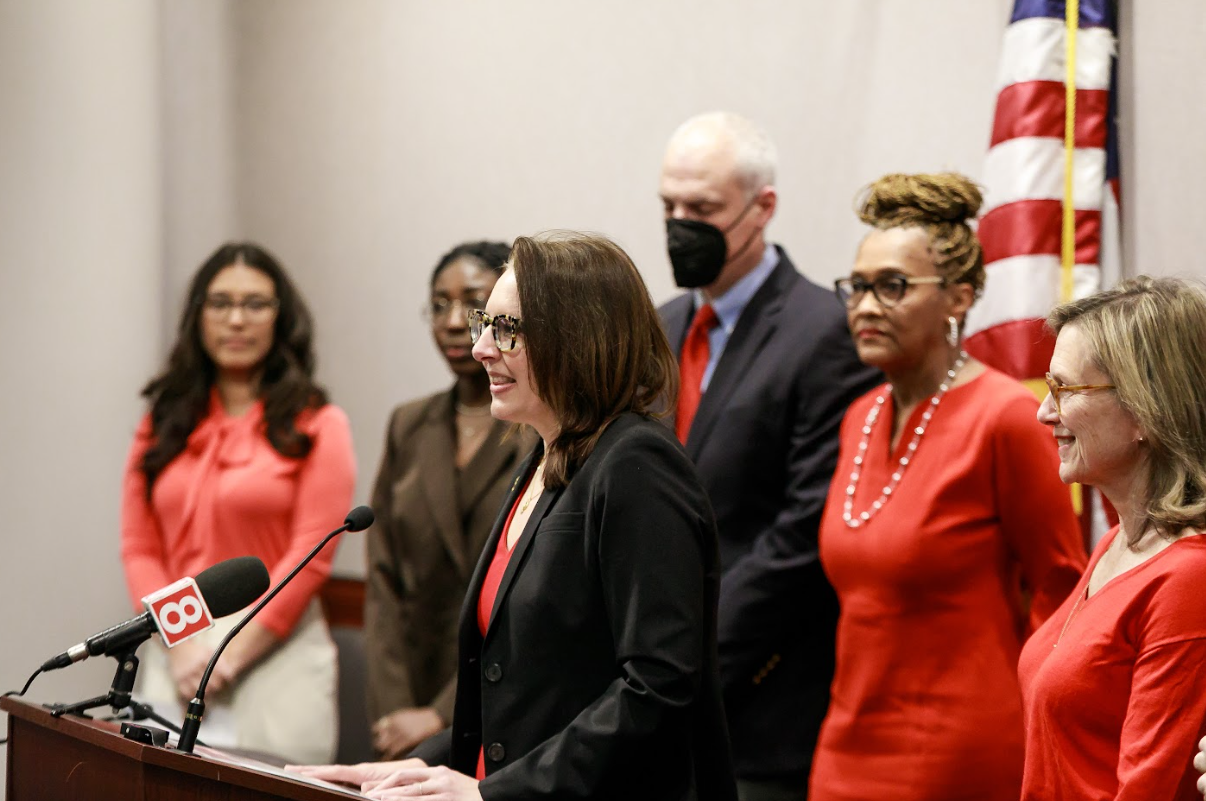Representatives Farrar, Porter, and Turco Seek to Close the Gender Pay Gap
March 16, 2023.
State Representatives Kate Farrar (D- West Hartford, Newington), Robyn Porter (D- Hamden, New Haven), and Gary Turco (D- Newington, New Britain), held a press conference to raise awareness of the gender pay gap in recognition of this week’s Equal Pay Day on March 14th. All three legislators Introduced House Bill No. 6273: An Act Concerning Disclosure of Salary Ranges on Public and Internal Job Postings, which aims to close the gender wage gap by requiring employers to disclose salary ranges on job postings.
"Equal Pay Day recognizes the day that women’s earnings catch up to men’s earnings from the prior year. The wage gap affects women of all ages, occupations, and educational backgrounds with more severe wage gaps for Black, Latina, and Native women. Our state has taken steps to close the wage gap but we need to do more,” explained State Rep. Farrar. “Current law puts the responsibility on the job seeker to request a salary range for a job position, reinforcing an imbalance of power between the employer and the applicant. House Bill 6273 can level the playing field and advance women’s economic prosperity in Connecticut.”
“Women earn less, on average than men, so they must work longer for the same amount of pay, and the wage gap is even greater for most women of color," said State Rep. Gary Turco. “Unequal pay hurts women, which hurts us all. We have to do more. HB 6273 is good for employees, and also employers since it ensures there is no misunderstanding with people who apply for a job and the expected pay for a position. It will help streamline the hiring process with qualified candidates and fill vacant positions sooner, which is better for business, our workforce and the economy.”
“Equal Pay Day originated on March 14th twenty-seven years ago and in 2023, we still continue this fight to eliminate the gender wage gap. Undoubtedly, progress has been slow, and we have so much further to go to create equitable wage opportunities for women, especially for women of color who must work even further into the year before realizing the same equal pay as their white female counterparts,” said State Rep. Robyn Porter. “Therefore, it is imperative that we work harder than ever before to dismantle the systemic barriers that rob women nationally of over one trillion dollars over their lifetimes. As a result, this loss comes as a detrimental cost to women, their families, our businesses, and our economy. This is why we must end the wage gap sooner than later and pay disclosure on job postings gets us one step closer to that end."
“It defies logic that in 2023, with more working women having a bachelor’s degree than men, and with more women than ever working in the legal, finance, management, engineering, and transportation sectors, that in Connecticut we’re still earning on average just 83 cents on the dollar -- or less -- compared to our male counterparts,” said State Senator Julie Kushner (D-Danbury, New Fairfield, Ridgefield). “What’s even more shocking is that Latinas working full-time in Connecticut are making just 49 cents on the dollar, and Black women working full-time are making 56 cents on the dollar. Forty-five years ago, I started organizing secretaries to improve salaries, and back then women earned 59 cents compared to men. It's unimaginable that Latinas and Black women don't even make as much as women earned in 1977. Pay disparity has come a long way, but there is still a huge financial chasm that must be addressed. One way to do that is by passing House Bill 6273, which would require employers to disclose salary ranges in all job postings. Men approach salary negotiations very differently than women -- and unconscious bias of employers is clearly a factor in determining pay. If employers post a salary range, that will help women catch up quicker to their male counterparts.”
“The gender pay gap means hard-working women only earn about four cents for every five their male coworkers make. That’s an unacceptable disparity, and one that has existed in our society for far too long – even as women make great strides and achievements every year. We need to take steps this year, and every year, to level the playing field and close this gap. I’m pleased I was able to lead passage of legislation to eliminate the salary history question a few years ago. That law is helping all workers – especially women – earn a fair wage. There is more work to do and this proposal is a key piece of it.” said State Senator Derek Slap (D-West Hartford, Farmington, Burlington, Bloomfield).
"The CHRO has been proud to be a part of the important steps our state has taken to close the gender pay gap in Connecticut in recent years, but on Equal Pay Day and every day, it's crucial to recognize that we must do more," stated Tanya Hughes, Executive Director of the Connecticut Commission on Human Rights and Opportunities (CHRO). "The gender pay gap continues to be unconscionably high, especially for Black, Indigenous, and Latina women. We will continue to work to address and eliminate this gap and all forms of discrimination."
“Connecticut still has a long way to go to close the income and wealth gaps for women and people of color. We have another opportunity to move closer to equity and a more just economy by passing H.B. 6273. Salary transparency protects the work and skills of women and people of color from being undervalued by potential employers and subjected to lowballing, discrimination, and other unfair salary negotiation practices." said Nicole Sanclemente, Policy Director of Connecticut Women's Education and Legal Fund (CWEALF).
"As a young Black woman pursuing my college degree in Connecticut, H.B. 6273 is especially significant because it allows for greater accountability through pay transparency,” said Benedicta Kwarteng, a senior at the University of Hartford. “I fully support passage of this proposed legislation because it will give me a better chance of being paid fairly as I start my career.”
Public Act 21-30: An Act Concerning the Disclosure of Salary Range did take a step towards greater pay transparency in Connecticut. H.B. 6273 would strengthen Connecticut's current law by eliminating the responsibility of job applicants to request the salary range. Other states and localities have passed laws specifically requiring pay ranges be included in job postings: New York, Colorado, Washington, California, New York City, Ithaca, NY; Westchester County, NY; and Jersey City, NJ.





